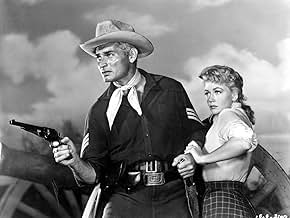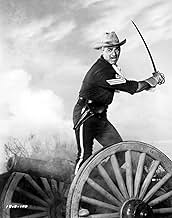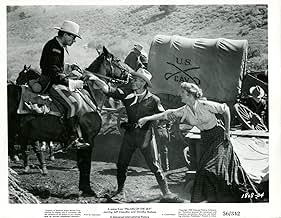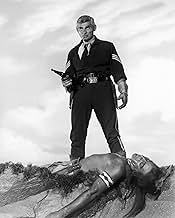In 1868 Oregon, after the Army violates the treaty by building a road across the reservation, several tribal chiefs decide to unite their forces against the trespassing whites.In 1868 Oregon, after the Army violates the treaty by building a road across the reservation, several tribal chiefs decide to unite their forces against the trespassing whites.In 1868 Oregon, after the Army violates the treaty by building a road across the reservation, several tribal chiefs decide to unite their forces against the trespassing whites.
- Director
- Writers
- All cast & crew
- Production, box office & more at IMDbPro
6.2841
1
2
3
4
5
6
7
8
9
10
Featured reviews
Cavalry vs Indians in 1868 by the Snake River with Jeff Chandler
Near the Oregon Trail in what is now southeastern Washington and northeastern Oregon, tribal leaders are upset by the movements of a new cavalry officer and his troops, which break the treaty. An established First Sergeant whom the Indians trust (Chandler) tries to keep the peace, but war is inevitable. Lee Marvin is on hand as a young sergeant while Michael Ansara plays a hostile chief.
"Pillars of the Sky" (1956) came in the tradition of John Ford's Cavalry Trilogy from 1948-1950 and the ensuing "Warpath," as well "The Last Frontier" (aka "Savage Wilderness"). While it's arguably just as worthwhile as the Cavalry Trilogy in its own unique way, it's not as compelling as the other two.
Some of the key actors playing American Indians are Lebanese, Latino, Tennessean, and a New Yorker, but one is a Kickapoo and there are some other genuine Indian peripherals. Overall, their depiction is well done. Meanwhile Chandler's character is supposed to be an alcoholic, but he doesn't look or act like a typical functioning alcoholic, such as Ulysses S. Grant. Actually, Jeff is towering and god-like as the commanding noncommissioned officer, despite his drinking.
There's a love triangle thrown into the mix involving Chandler, Dorothy Malone and Keith Andes. While this might cause some eye-rolling, I'm pretty sure there were one or two love triangles during the decades of the Indian Wars. Speaking of rolling your eyes, there's some lame (and incongruous) comedy involving a raw recruit and his horse, but it's so minor it can be overlooked.
The best thing about this Western is the superb authentic locations and the muscular action. But I also liked the emphasis on Christianity with Ward Bond playing the missionary-physician. You'd never see this today, of course, as it's a great sin now to show Christianity in a positive light. Get real.
It runs 1 hour, 26 minutes (the version I watched), and was shot in northeast Oregon at Joseph and nearby Wallowa Lake, as well as LaGrande, which is to the west of there. Studio scenes were done at Universal Studios in the Los Angeles area.
GRADE: B-
"Pillars of the Sky" (1956) came in the tradition of John Ford's Cavalry Trilogy from 1948-1950 and the ensuing "Warpath," as well "The Last Frontier" (aka "Savage Wilderness"). While it's arguably just as worthwhile as the Cavalry Trilogy in its own unique way, it's not as compelling as the other two.
Some of the key actors playing American Indians are Lebanese, Latino, Tennessean, and a New Yorker, but one is a Kickapoo and there are some other genuine Indian peripherals. Overall, their depiction is well done. Meanwhile Chandler's character is supposed to be an alcoholic, but he doesn't look or act like a typical functioning alcoholic, such as Ulysses S. Grant. Actually, Jeff is towering and god-like as the commanding noncommissioned officer, despite his drinking.
There's a love triangle thrown into the mix involving Chandler, Dorothy Malone and Keith Andes. While this might cause some eye-rolling, I'm pretty sure there were one or two love triangles during the decades of the Indian Wars. Speaking of rolling your eyes, there's some lame (and incongruous) comedy involving a raw recruit and his horse, but it's so minor it can be overlooked.
The best thing about this Western is the superb authentic locations and the muscular action. But I also liked the emphasis on Christianity with Ward Bond playing the missionary-physician. You'd never see this today, of course, as it's a great sin now to show Christianity in a positive light. Get real.
It runs 1 hour, 26 minutes (the version I watched), and was shot in northeast Oregon at Joseph and nearby Wallowa Lake, as well as LaGrande, which is to the west of there. Studio scenes were done at Universal Studios in the Los Angeles area.
GRADE: B-
Solid western, that is all
I am not a huge fan of westerns but from time to time I don't mind watching some on TV. The problem is that most of the time the plots are all very similar... originality is not a trademark of the genre. Yet PILLARS OF THE SKY was a bit different. Let's see why.
In 1868 Oregon various Indian tribes are confined in a reserve built by Doctor Holden (Ward Bond) and Sergeant Emmet Bell (Jeff Chandler) has to make sure that there is always peace. However, some transfert of US Army Weapons makes chief Kamiakin (Michael Ansara) very suspicious and they attack the Army. Unfortunately appeals for a truce don't work, and after Kamiakin is killed by one of his own the other chiefs and Bell will do whatever is necessary for keeping the peace.
The acting was very good for a Western. Jeff Chandler was very good and believable as an Army Sergeant that is very concerned about keeping the peace between the Army and the Indians. Dorothy Malone gives a great performance other than still looking gorgeous, and the cast is chock full of many familiar faces of those years: Martin Milner, Lee Marvin, Willis Bouchey, Philip Carey and a scene-stealing Michael Ansara are all pretty entertaining. The Oregon scenery was great and makes you want to go on vacation there, and the soundtrack fit the movie's spirit very well.
If you are a die hard western fan don't miss it if you haven't seen it, but for those who watch them from time to time it's solid and entertaining... what more you can ask?
In 1868 Oregon various Indian tribes are confined in a reserve built by Doctor Holden (Ward Bond) and Sergeant Emmet Bell (Jeff Chandler) has to make sure that there is always peace. However, some transfert of US Army Weapons makes chief Kamiakin (Michael Ansara) very suspicious and they attack the Army. Unfortunately appeals for a truce don't work, and after Kamiakin is killed by one of his own the other chiefs and Bell will do whatever is necessary for keeping the peace.
The acting was very good for a Western. Jeff Chandler was very good and believable as an Army Sergeant that is very concerned about keeping the peace between the Army and the Indians. Dorothy Malone gives a great performance other than still looking gorgeous, and the cast is chock full of many familiar faces of those years: Martin Milner, Lee Marvin, Willis Bouchey, Philip Carey and a scene-stealing Michael Ansara are all pretty entertaining. The Oregon scenery was great and makes you want to go on vacation there, and the soundtrack fit the movie's spirit very well.
If you are a die hard western fan don't miss it if you haven't seen it, but for those who watch them from time to time it's solid and entertaining... what more you can ask?
A solid action western
This fine western is a cavalry-Indian affair that has the usual treaty-breaking by the government as it builds a road and fort on Indian land that causes an uproar and leads to war. The military's action sets in motion cavalry-Indian hostilities and the tribes gather for an attack on the fort. Many of the Indians have been baptised and converted to Christianity by a white missionary and live in peace with the soldiers, many serving as scouts under a sergeant played by Jeff Chandler. Complicating matters are two white women the Indians hold as hostages who are at great risk should war break out. Chandler did some his best work in westerns and is the lieutenant whom the Indian soldiers respect and follow faithfully. Chandler's flirtation with a married woman, played by Dorothy Malone, doesn't have much to do with the story other than to give the leading man a romantic interest. Ward Bond, Michael Ansara and Keith Andes are good in supporting roles. Oregon's scenic beauty is on display in this CinemaScope film.
Different, and surprisingly good
Given the basically no-star cast and the fact that it came from Universal-International, it's understandable that you might think this would be just another run-of-the-mill "B" oater--and you'd be dead wrong. This first-rate western has several things going for it. The breathtaking Oregon locations have been beautifully captured by Harold Lipstein's expert Technicolor cinematography. The colors are lush, and the photography is so atmospheric you can almost feel the chill in your bones as the troops slog through the rugged mountain country. There are several rousingly staged and exciting action scenes, notably a somewhat lengthy sequence in which a wagon train loaded with troops cuts its way through a mass of charging Indians. The performances by a cast of veteran character actors--Lee Marvin in an early role (although his Irish brogue is a bit much), Keith Andes, Charles Horvath, Alberto Morin and Willis Bouchey, among others--are top-notch, Dorothy Malone is beautiful, Jeff Chandler gives a more authoritative (and animated) performance than he usually did and Ward Bond does an outstanding job as a caring and concerned missionary who doesn't want to see bloodshed on either side. The main thing the film has going for it, though, is the subject matter. Rather than having the usual Apaches or Comanches rampaging through the Southwest, the film is set in the Oregon mountain country, and the Indians are not superstitious savages but have been converted to Christianity by missionary Bond, and many in their religious zeal have given up their "animal" names and taken the names of Biblical figures (to further drive the point home, one soldier complains to Bond that, since he has "Christianized" the Indians, they have no qualms about attacking at night; "uncivilized" Indians never attacked at night for fear that if they were killed, their spirits would roam in the dark forever and never find peace). As far as I know, this particular facet of the Indian wars had never been tackled before or, for that matter, since. The story consistently holds your interest (although the triangle between Chandler, Malone and Andes tends to slow things down somewhat), the action scenes are terrific, the photography, as noted, is superb. A very worthy effort from veteran director George Marshall. Well worth your time.
Pretty good western chronicles a strong fight between the Indian tribes and the US cavalry in Oregon territory
This is the story of Sgt. Emmet Bell (Jeff Chandler) who found his weakness in the arms of another man's woman (Dorothy Malone) and his strength in the power of another man's God . In Oregon Country , 1868 , numerous tribes of Native Americans with Biblic and Evangelist names have been placed on a reservation north of the Snake River . Here a priest called Holden (War Bond) , has constructed a church , and many of the tribes have accepted Christianity and Christian names such as Samuel , Aaron , Abraham , Jacob ; in fact , the three Indian chiefs hold Christian names : Elias , Isaias and Zacarias . But the White Men are building a bridge that across the river to Indian territory to areas north . When the cavalry, under the command of Col. Stedlow (Willis Bouchey) and Capt. Tom Gaxton (Keith Andes) arrive they intend to make peace but the tribal chiefs feel their treaty has been violated . As the cavalry column advances into the reservation , Kamiakin (Michael Ansara) carries out razzias against the US Cavalry and settlements .
A-Universal-International-Picture gets Western action , shootouts , a triangular love story , breathtaking Indian raids on Yankees regiments and results to be quite entertaining . This moving movie is an epic portrait of the thrilling story about several tribal chiefs decide to unite their forces against the trespassing whites who open a road across the reservation and are building a bridge crossing their lands . It's a medium budget film with good actors , technicians , production values and pleasing results . At the ending , when takes place the Indian assault , possesses all the sweep , grandeur and noisy action of the greatest Westerns of an age long past . The picture contains spectacular charges of Indian riders , including an overwhelming final when the US soldiers are besieged at a church turned into a strongly defended fort . Nice acting from a great cast . As Jeff Chandler is good as a honorable and Cristian Sergeant who is in charge of maintaining order and attempts to keep the peace between US cavalry and Indians . Chandler gives stature to the role , providing sincerity and bravura . Chandler was famous , until his early death , for playing Indian chief Cochise , a dignified portrait well shown in : ¨Broken arrow¨ , ¨Battle of Apache Pass¨ and ¨Taza , son of Cochise¨ . Although Chandler also played all kinds of genres , such as : ¨Return to Peyton Place¨(drama) , ¨Flame of Araby¨ (adventure) , ¨Merrill's marauders¨ (wartime , in his last film) , until his early death at 42-year-old . Dorothy Malone as gorgeous and pleasant wife , proves to be a great actress , as usual . And support cast is frankly excellent , such as : Ward Bond , Keith Andes , Lee Marvin , Sydney Chaplin, Olive Carey and special mention for the veteran Willis Bouchey as well as Michael Ansara as violent Indian chief vowing to lead the tribes in battle against the encroaching white men . This exciting and stirring Western was beautifully photographed in Cinemascope , print in Technicolor by Harold Lipstein , Universal's ordinary cameraman. And an original and shining score from William Lava and Heinz Roemheld , though uncredited .
This motion picture was professionally directed by George Marshall in colorful style , though has a few flaws . He realized a great number of films , especially Westerns . His first Western was ¨Wild Gold¨(1934) and he subsequently directed ¨Destry rides again¨ with James Stewart and Marlene Dietrich in which years later he would make a remake titled ¨Frenchie¨ with Audie Murphy and Marie Blanchard . As George Marshal introduces hilarious elements and amusement in his Westerns , such as ¨Texas¨ , ¨Fancy pants¨, ¨Advance to the rear¨, and also directs Musical Westerns as ¨Red Garters¨ and ¨The second greatest sex¨ . Being particularly known for his co-direction of the epic Western ¨How the west was won¨ along with Henry Hathaway and John Ford .
A-Universal-International-Picture gets Western action , shootouts , a triangular love story , breathtaking Indian raids on Yankees regiments and results to be quite entertaining . This moving movie is an epic portrait of the thrilling story about several tribal chiefs decide to unite their forces against the trespassing whites who open a road across the reservation and are building a bridge crossing their lands . It's a medium budget film with good actors , technicians , production values and pleasing results . At the ending , when takes place the Indian assault , possesses all the sweep , grandeur and noisy action of the greatest Westerns of an age long past . The picture contains spectacular charges of Indian riders , including an overwhelming final when the US soldiers are besieged at a church turned into a strongly defended fort . Nice acting from a great cast . As Jeff Chandler is good as a honorable and Cristian Sergeant who is in charge of maintaining order and attempts to keep the peace between US cavalry and Indians . Chandler gives stature to the role , providing sincerity and bravura . Chandler was famous , until his early death , for playing Indian chief Cochise , a dignified portrait well shown in : ¨Broken arrow¨ , ¨Battle of Apache Pass¨ and ¨Taza , son of Cochise¨ . Although Chandler also played all kinds of genres , such as : ¨Return to Peyton Place¨(drama) , ¨Flame of Araby¨ (adventure) , ¨Merrill's marauders¨ (wartime , in his last film) , until his early death at 42-year-old . Dorothy Malone as gorgeous and pleasant wife , proves to be a great actress , as usual . And support cast is frankly excellent , such as : Ward Bond , Keith Andes , Lee Marvin , Sydney Chaplin, Olive Carey and special mention for the veteran Willis Bouchey as well as Michael Ansara as violent Indian chief vowing to lead the tribes in battle against the encroaching white men . This exciting and stirring Western was beautifully photographed in Cinemascope , print in Technicolor by Harold Lipstein , Universal's ordinary cameraman. And an original and shining score from William Lava and Heinz Roemheld , though uncredited .
This motion picture was professionally directed by George Marshall in colorful style , though has a few flaws . He realized a great number of films , especially Westerns . His first Western was ¨Wild Gold¨(1934) and he subsequently directed ¨Destry rides again¨ with James Stewart and Marlene Dietrich in which years later he would make a remake titled ¨Frenchie¨ with Audie Murphy and Marie Blanchard . As George Marshal introduces hilarious elements and amusement in his Westerns , such as ¨Texas¨ , ¨Fancy pants¨, ¨Advance to the rear¨, and also directs Musical Westerns as ¨Red Garters¨ and ¨The second greatest sex¨ . Being particularly known for his co-direction of the epic Western ¨How the west was won¨ along with Henry Hathaway and John Ford .
Did you know
- TriviaBetween takes, Ward Bond argued with Lee Marvin that the US should attack the Soviet Union because of what Bond claimed to be the Communist threat. Marvin, an ex-Marine who served in World War II, was wounded in the fighting on Saipan against the Japanese,. He asked Bond--who had never spent a day in the military due to epilepsy, --how he spent the war. Bond had no real reply, and Marvin pointed out that the only thing Bond knew about war was what he pretended to fight on studio back lots.
- GoofsThe cavalry had a Red Cross wagon. The American Red Cross was not founded until 1881.
- ConnectionsFeatured in Cuba (1979)
- SoundtracksBugle Calls
(uncredited)
Composer unknown
Details
Box office
- Gross US & Canada
- $1,500,000
- Runtime
- 1h 35m(95 min)
- Aspect ratio
- 2.35 : 1
Contribute to this page
Suggest an edit or add missing content







































